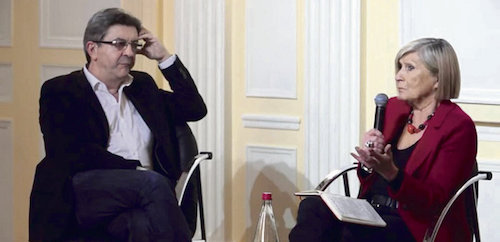Chantal Mouffe, the philosopher who inspires Jean-Luc Mélenchon

Raphaëlle Besse Desmoulières' profile of Chantal Mouffe first appeared in Le Monde. Translated by David Broder.
Jean-Luc Mélenchon and Chantal Mouffe. via YouTube.
Looking through Chantal Mouffe’s desk diary is like leafing through an atlas of Europe. Madrid, Athens, Lisbon, Barcelona, Paris: here the cities line up as her travels demand. In late October, upon the invitation of the Mémoire des luttes association, the Belgian philosopher was in the French capital for a "dialogue" with Jean-Luc Mélenchon, La France insoumise’s ["Rebellious France’s"] candidate for the 2017 presidential elections. "Mélenchon’s project is a left-populist one, even if I am not sure that he will present it like that," explains the political theory professor from London’s Westminster University. "But he constructs what we would call the 'populist' political boundary: the people against the establishment."
The obsession with consensus
The notion of "populism" is at the heart of this small but energetic woman’s thinking. While Chantal Mouffe is recognised internationally, in France she long remained in the shadow of her husband, the Argentinian philosopher Ernesto Laclau, considered the theorist of Latin America’s new Left. After her husband’s death in 2014 Mouffe continued their work, albeit preserving her own particularities.
She thinks that we need to go beyond the pejorative perception often attached to the term “populism.” That is the subject of her book On the Political. One of her most recent books to appear in France [French title L’illusion du consensus; Paris, Albin-Michel], published at the beginning of 2016 eleven years after it came out in England. In this book the author elaborates the idea that conflict is constitutive of politics and that we have to break out of the obsession with consensus, which is slowly killing democracy.
For her, the boundary between Right and Left has gradually been worn away, the parties of centre Left and centre Right having reached agreement on the idea that there is no alternative to neoliberalism. This is what she calls "post-politics." "When citizens go to vote they see no difference between the choices facing them. That has allowed the development of right-populism," she explains. "Marine Le Pen speaks to the pain of the popular classes, telling them that foreigners are the cause of their problems. We need another, opposed discourse built on the basis of equality."
According to Mouffe, who is also a philosopher of art, only Jean-Luc Mélenchon is capable of holding his own in this regard. Indeed, he has chosen [to set up] a movement that rejects the labels of Left and Right. "She is not the organic intellectual for La France insoumise but even so she is a source of inspiration for us," Mr. Mélenchon’s spokesman Alexis Corbière acknowledges.
Even if some of their positions are different — for example, on Europe — we can identify a certain similarity in the vocabulary they each use, especially when Chantal Mouffe opposes "the people" and "the oligarchy," "those down below" and "those on top." These are words also invoked by the presidential candidate. One of his supporters, Roger Martelli — a historian of communism and former leading member of the French Communist Party — is however distrustful of this, considering it a "dangerous dialectic." "In a second you’re trapped. Right-populism will always win. It is a fight lost in advance," argues Martelli, who debated Chantal Mouffe upon the invitation of the Parti de gauche in late August.
The "bible of post-Marxism"
French is this Belgian woman’s mother tongue, but she writes her often taxing books in English. Their sources of inspiration include the works of Carl Schmitt (1888-1985), an anti-liberal thinker and Nazi jurist. This has earned her a lot of criticism. She is unapologetic: "You don’t decide whether to delve into a thinker’s work on the basis of their moral qualities, but on the basis of their theoretical qualities." Rather than understand the antagonism in terms of friend and enemy like Carl Schmitt does, she prefers to speak of "agonism," a non-violent resolution of the conflict between two adversaries, who each recognise the other’s legitimacy.
"There was nothing to predestine me to being left-wing," admits Mouffe, who has never been a member of a political party. A doctor’s daughter, Chantal Mouffe was born to a bourgeois Belgian Catholic family in 1943. She began her philosophy studies in Louvain, where she got involved in student unionism. Two events would mark her as a young woman: the Cuban Revolution and the war in Algeria.
In 1964 she enrolled at the Ecole pratique des hautes études and met the philosopher Louis Althusser. "I fell under his influence. We met as a small group to read Das Kapital with him. That was my theoretical formation." Eight years later, after a spell in Colombia — "I missed out on May ‘68," she regretfully notes — she met Ernesto Laclau at Essex University. The couple made their home in London. Between 1989 and 1995 she made round trips to Paris, having become programme director of the Collège international de philosophie at the invitation of Jacques Derrida.
After writing on the Italian Marxist thinker Antonio Gramsci, she together with Ernesto Laclau embarked on their best-known work, Hegemony and Socialist Strategy, which was published in 1985. Often presented as the "bible of post-Marxism," the essay was not however published in French translation until 2009. "Mouffe really disappeared in favour of Laclau alone," laments Pauline Colonna d’Istria, her editor at Albin-Michel. "Hegemony and Socialist Strategy remained his book, relegating her to the second rank. Which really shows the academic world’s basic misogyny."
Their works did much to inspire Podemos leaders’ reflection in Spain. Chantal Mouffe has above all made links with the movement’s number two figure, Iñigo Errejon. "I have been Podemised," she jokes. "Seeing that my ideas inspire people and that that informs their practices is the best gift anyone could give me." But will the next stage be the "rebellion" advocated by Jean-Luc Mélenchon?